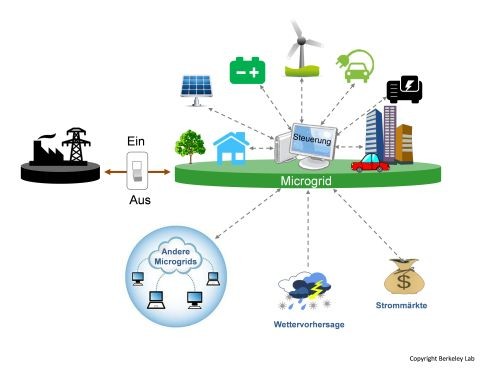Basic Research Smart- and Microgrids: Innovative, Self-learning System Control for Decentralized Energy Resources & Microgrids
BEST – Bioenergy and Sustainable Technologies GmbH is a technological pioneer in the field of control systems for bioenergy technologies. This basic research project provides the foundation for innovative self-learning control concepts of microgrids including heat, electricity and bio-synthetic natural gas (SNG) or biogas.
Microgrids, a sub-area of intelligent electricity/power grids (smart grids), have a close spatial connection between energy generation units and consumers. The various markets (the largest are Asia, North America and Europe) are characterized by different mixes, including technologies such as biomass, photovoltaics, combined heat and power and storage technology. In use, these technologies should be coordinated and controlled.
The supervisory controller is responsible for the optimization of various distributed energy resources (DERs) and their coordinated real-time operation in the system. Currently, it is under development at BEST. The modeling framework for the Microgrid Supervisory Controller, is based on Model Predictive Control (MPC). At each time step, the MPC controller computes the setpoints by solving an open optimization problem for the defined time period and then applies the first values of the computed control sequences to the system. At the next time step, the updated states and measured values of the system are determined by the controller, and then the optimization step is repeated.
AI-based prediction algorithms will be developed to forecast load and generation (e.g., PV) and implemented as part of the supervisory control system. Real-time measurements of building and utility data, and of different technologies, are collected by various sensors via standardized communication interfaces, e.g. Modbus/TCP communication protocol.
In order to evaluate the developed mathematical and physical models, relevant case studies were conducted. Thereby, possible energy saving potentials through the optimized operation of bioheat technologies in combination with solar technologies and micro-CHPs and the resulting CO2 savings were investigated. Among others, results are used to extrapolate the potential for the new system control technology to larger regions.
The development of higher-level control algorithms and the resulting optimal coordination of generation and consumption will further increase the self-use of regeneratively generated energy in communities and settlements. This will lead to a significant reduction in costs and CO2 emissions. Furthermore, this innovative approach will accelerate the achievement of climate targets, increase security of supply for communities, and create new use cases for utilities and grid operators.
Projektlaufzeit
2017-12-01 - 2022-06-30
Supported by
FTI – Forschung,- Technologie- und Innovationsprogramm Niederösterreich
Area Management

Area Manager
Stefan Aigenbauer
stefan.Aigenbauer@best-research.eu


